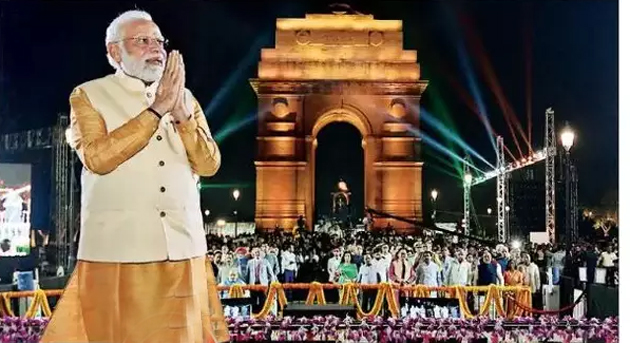Yog Rahi Gupta
The recent Lok Sabha elections last month, marked a pivotal moment for India, with the formation of a new government 3rd time under Prime Minister Narendra Modi. As someone who traveled extensively across India during the election period, I witnessed firsthand the vibrant democratic processes and the palpable hopes and concerns of the people. Despite the electoral din, the newly elected government now faces a series of formidable challenges that will test its resolve and strategic acumen.
The political landscape in India remains complex, with a coalition government at the center led by the BJP. Prime Minister Modi, despite a somewhat diminished mandate, continues to be a dominant political figure. His leadership style, characterized by decisiveness and a clear ideological vision, is likely to persist. However, navigating coalition dynamics while implementing bold reforms will require a delicate balance between assertiveness and consensus-building.
India’s GDP growth rate, hovering around 7% per annum, is a beacon of hope amidst global economic uncertainties. The Modi government’s pro-business stance has significantly improved the investment climate. The next critical step is to transition from a business-friendly to a market-friendly approach, fostering an environment where all businesses, not just a few, can thrive. This shift could catalyze a broader economic transformation, positioning India as a key player in the global economy.
India’s external environment is increasingly volatile. The ongoing conflicts in Europe and West Asia, coupled with the unpredictable foreign policies of major powers, demand agile and sophisticated diplomacy. The assumption that India’s role as a counterbalance to China will remain unchallenged is optimistic. Historical precedents during the Cold War suggest that major powers may recalibrate their relations, potentially shrinking India’s strategic space and increasing its vulnerability to Chinese pressure.
The Indo-Pacific region remains a critical theater for India’s strategic interests. The postponement of the Quad summit and the growing importance of alliances like AUKUS underscore shifting dynamics. India must navigate these changes carefully, ensuring that its strategic partnerships are robust and adaptable. The allegations of assassination plots involving Indian intelligence agents could further complicate relations with key Western partners. This requires a transparent investigation and a proactive strategy to manage potential diplomatic fallout.
Domestically, the government must address significant challenges such as socio-economic disparities, unemployment, and agricultural distress. While the overall economic indicators are positive, these underlying issues pose a risk to sustainable growth and social stability. Effective policies to address these concerns are crucial for maintaining the confidence of the populace and ensuring inclusive development.
In a significant diplomatic move, Prime Minister Modi recently visited the Soviet Union, where he secured a crucial defense deal, further solidifying the strong relationship between the two nations. Despite pressure from the United States to distance itself from Moscow, India has maintained a balanced approach, prioritizing its strategic interests. During this visit, Prime Minister Modi was honored with the highest Soviet Union accolade, recognizing his efforts to strengthen bilateral ties. This relationship not only underscores India’s independent foreign policy but also enhances its strategic capabilities in a turbulent geopolitical environment.
India has maintained a clear and principled stance on global conflicts, advocating for peaceful resolutions. Amid the ongoing Russia-Ukraine war, India has called for both sides to resolve the conflict peacefully and has even offered to mediate. Similarly, in the Israel-Gaza conflict, India’s position has consistently emphasized the need for a peaceful solution, underscoring its commitment to diplomacy and international peace.
During my travels across India during the election period, I observed a nation at a crossroads. The opposition’s efforts to spread misinformation, particularly regarding constitutional changes and economic promises, created a climate of confusion and skepticism. However, the resilience of the Indian electorate was evident, reflecting a deep commitment to democratic values. The new government must build on this foundation of trust, ensuring transparency and accountability in its actions.
The newly elected Indian government faces a challenging landscape, both domestically and internationally. However, the strong GDP growth and a favorable investment climate provide a solid foundation for tackling these issues. With strategic foresight, inclusive policies, and agile diplomacy, India can navigate these challenges and continue its trajectory towards becoming a global economic powerhouse. The journey ahead will require not just strong leadership but also a collective effort to harness the nation’s vast potential. The recent strengthening of ties with the Soviet Union and India’s neutral stance on global conflicts are testaments to its strategic acumen and commitment to international peace, even amidst external pressures.


